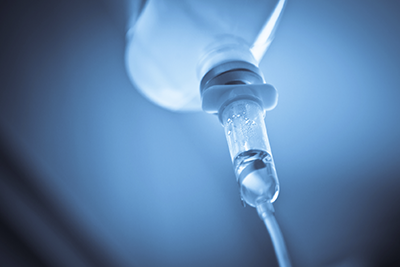Scopolamine May Offer Clues About Fast-Acting Antidepressants

Ketamine’s ability to relieve symptoms of treatment-resistant depression in a matter of hours has captured the attention of clinicians and patients alike. However, it’s not the only medication on the market capable of exerting rapid antidepressant effects, according to David Janowsky, M.D.
During the Rapid-Fire Talks: Focus on Depressive Disorders series today at APA’s Annual Meeting, Janowksy, an emeritus professor of psychiatry at the University of California, San Diego, described the results of several small clinical trials that point to the rapid antidepressant effects of scopolamine—a muscarinic acetylcholine receptor antagonist commonly used to treat motion sickness and nausea after surgery.
In 2006, Maura Furey, Ph.D., and Wayne Drevets, M.D., of the National Institute of Mental Health discovered that symptoms of depression and anxiety decreased quickly in patients with major depressive disorder or bipolar disorder who received scopolamine intravenously. The researchers compared nine patients who received three infusions of scopolamine over approximately 10 days, followed by three infusions of placebo over the same timeframe with nine patients who first received three infusions of placebo, followed by three infusions of scopolamine.
The patients—many of whom had a poor prognosis for response to treatment—who received scopolamine first showed a greater reduction in Montgomery–Åsberg Depression Rating Scale (MADRS) score compared with patients who received placebo first. Scopolamine effects began as early as 24 hours after the first infusion and continued to improve over the next two infusions. These improvements lasted at least 10 days following the last scopolamine dose. A follow-up study of 23 patients with MDD found scopolamine produced similar antidepressant effects.
In 2012, researchers in Iran led by Danial Khajavi, M.D., compared 40 patients with MDD randomly assigned to either oral scopolamine plus citalopram or citalopram plus placebo. Augmentation with scopolamine was significantly more effective than placebo, with 65 percent of patients receiving scopolamine showing higher rates of response at week 4 and remission at week 6 than patients receiving placebo.
“Here’s a drug that has good potential and is cheap, but it’s being ignored clinically. For whatever reason, this one hasn’t taken off,” Janowksy told Psychiatric News.
Despite the limited number of clinical studies of scopolamine for depression, Janowsky noted he has seen growing preclinical interest in the medication of late. For instance, recent animal models of depression suggest subthreshold doses of scopolamine and ketamine may have a stronger effect when given together. Janowsky said his hope is that such studies can lead to greater interest in exploring the relationship between scopolamine and other neurochemical changes in depression, and ultimately additional clinical trials.
“There’s been a tremendous amount of research on dopamine and serotonin, and right now, glutamate is hot. But, here’s a neurotransmitter system that should be a priority for understanding the neurochemistry of depression and mania,” Janowsky said. He added that the antidepressant effect of scopolamine is consistent with the adrenergic-cholinergic balance hypothesis of mania and depression that he proposed some 45 years ago. “Understanding the muscarinic cholinergic system in depression could lead to a whole new direction in antidepressant treatment.”
|
|
|
|
|


